Periodontal (Gum) Treatment – Jupiter, FL
Healthy Gums for Healthy Smiles
Did you know that about 80% of the US adult population currently has some form of periodontal (gum) disease? This is a bacterial infection that affects the gums and underlying jawbone near the teeth, and while early symptoms are mild (redness, swelling, tenderness), it can eventually cause gum recession and even tooth loss. At Jupiter Implant & Cosmetic Dentistry, we’re able to take care of more than just your teeth, as we offer an array of periodontal disease treatments that are designed to eliminate the infection at the source. We are dedicated to helping our patients enjoy healthy gums for healthy smiles, so give us a call today to schedule your next appointment and learn more about periodontal disease!
Why Choose Our Dental Office for Periodontal Therapy?
- Thorough periodontal screenings performed at every checkup
- Fast, precise, & gentle laser gum therapy available
- Specialty cleanings performed by expert hygiene team
What is Gum Disease?
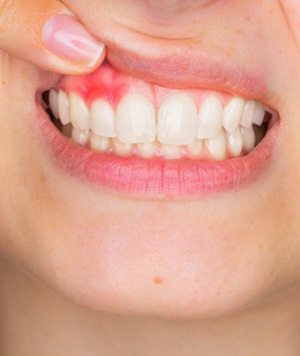
It is common knowledge that dental cavities are caused by sugar-eating bacteria in the mouth. However, did you know that these same bacteria can also damage your gums? When plaque and oral bacteria build up around the teeth, they begin to irritate the gums and eventually infect them. This infection is known as gum disease.
The initial stage of gum disease is called gingivitis, and it’s extremely common. Gingivitis causes a range of frustrating symptoms, but it can be fully reversed if properly addressed. However, if gingivitis is left untreated, it can advance into periodontitis. This advanced form of gum disease cannot be cured, and it can cause permanent damage to the teeth and jawbone. There are a growing number of scientific studies that link periodontitis to an increased risk of systemic issues such as heart disease and Alzheimer’s disease as well.
Fortunately, keeping yourself healthy can be as simple as practicing good oral hygiene and staying on the lookout for the early warning signs of gum disease.
Symptoms of Gum Disease

The most common symptoms of gingivitis include:
- Swollen, puffy, and bright red gums
- Gums that feel somewhat tender to the touch
- Persistent bad breath that does not go away with regular toothbrushing
- Gums that bleed easily when brushing or flossing
Meanwhile, common indications of periodontitis are:
- Gum recession, or teeth that look longer than usual
- Dental ain while chewing or talking
- Severe or sudden stabbing tooth sensitivity
- Loose permanent teeth
How Do We Treat Gum Disease?

At Jupiter Implant & Cosmetic Dentistry, we take gum disease very seriously. We perform a thorough gum health check to screen for gingivitis and periodontitis during each checkup. Should we detect any issues, we offer several different gum disease treatments to stop the infection in its tracks and help you reclaim your healthy smile. Depending on your unique situation, we may recommend scaling and root planing, laser gum disease treatment, or antibiotic treatment.
Scaling & Root Planing
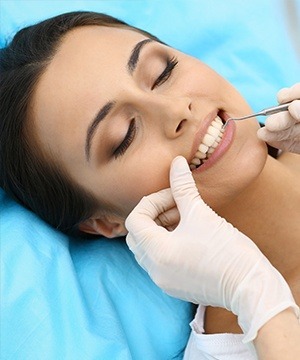
Scaling and root planing is one of the most common services recommended for addressing gum disease. It is a type of cleaning that is specifically designed to remove the harmful deposits of plaque and bacteria, and tackle the infection at its source.
First, an ultrasonic cleaner is used to break up any plaque deposits beneath the gums (scaling), and then the roots of the teeth are gently reshaped and smoothed out (planing). This will make plaque less likely to gather on them in the future, lowering a person’s risk for reinfection.
Why Do I Need Scaling and Root Planing?

When gum disease attacks the soft oral tissues of your mouth, it may manifest itself in a way that has you seeing red, inflamed, and bleeding gums. If detected early enough, the symptoms can be easily reversed with regular cleanings and good oral hygiene at home. However, if left untreated, the plaque-causing bacteria can spread beneath the gumline and begin to attack the jawbone itself and create gum pockets that make it easier for bacteria to become trapped.
At this stage, which is typically known as periodontitis, the gum tissue will pull away from your teeth and expose the sensitive roots. The jawbone will be weakened, loosening the foundation of your teeth and eventually causing tooth loss.
How Does Scaling & Root Planing Work?

When recommending scaling and root planing in Jupiter, you can expect to undergo a process that will be extraordinarily beneficial to your oral and overall health.
As a two-part cleaning process, it removes plaque deposits along the gumline and within the gum pockets while attacking the infection. Our team of professionals will use an ultrasonic cleaner to begin the scaling process of breaking up and removing plaque buildup beneath the gums. It will be important that we clean as deep as the gum pockets extend to ensure all plaque is thoroughly removed.
Then, we will smooth out your tooth roots, reshaping them and minimizing the chances of plaque buildup in the future.
Depending on the severity of your case, it is possible that you may need to attend multiple appointments to ensure reinfection does not occur.
What is the Aftercare Process Like for Scaling & Root Planing?
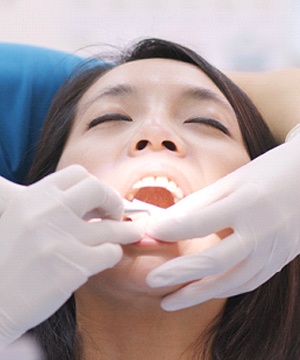
After your scaling and root planing procedure is complete, you can expect to experience some discomfort once the numbing agent wears off. It is advised that you take an over-the-counter pain reliever and use a cold compress to minimize swelling and alleviate any uncomfortable side effects you may experience.
Should you receive sedation prior to your scaling and root planing procedure, make sure to avoid eating until you are no longer experiencing the effects of sedation. You will also want to eat soft foods in the first 48 hours and avoid smoking, using tobacco, or drinking alcohol. If you are prescribed any medication, make sure to take it as instructed, and don’t hesitate to perform a saltwater rinse to speed up the healing process.
Laser Gum Disease Treatment with Soft Tissue Laser
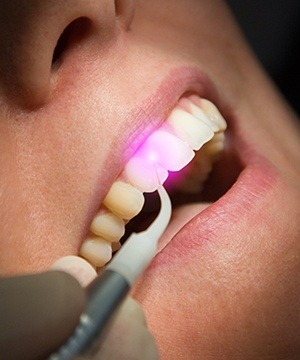
Laser gum therapy enables our team to eliminate harmful bacteria from along the gum line without irritating the gums themselves. Our soft tissue laser’s beam of light is able to instantly vaporize bacteria, and at the same time, it actually sanitizes the treatment area and cauterizes blood vessels. As a result, a patient experiences little to no discomfort, bleeding, or swelling during or after the procedure. The instrument itself emits very little heat, sound, and vibration as well, making it easy for patients to stay relaxed.
What Is Soft Tissue Laser Therapy?
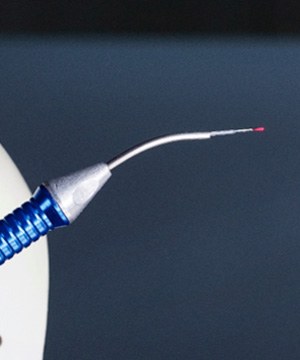
Using a soft tissue laser, we can direct the highly concentrated beam of light energy to the diseased tissue. This method is effective at killing over 99% of bacteria while leaving the healthy areas untouched. Ultimately, this is a way to sterilize your gums to reduce the risk of infection. Because the laser cauterizes the tissue as it goes, you are much less likely to experience post-operative bleeding. This encourages a quick, comfortable recovery.
Am I a Candidate for Soft Tissue Laser Dentistry?
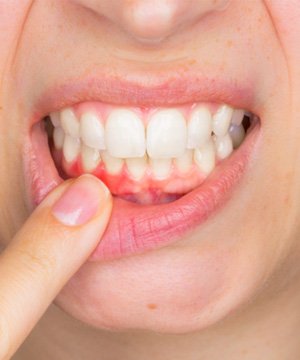
Soft tissue laser therapy is used for patients who are suffering from moderate to severe gum disease. You may be a good candidate for this procedure if you have:
- Periodontal pocket depths that are deeper than 4mm.
- Pockets that keep breaking down during treatment.
- Suffer from gingival overgrowth.
To find out if soft tissue laser dentistry is right for you, schedule an appointment with us. This way, we can examine your smile and put together a treatment plan that is right for you.
Benefits of Soft Tissue Laser Dentistry

Laser dentistry provides a long list of advantages. Here are just some of the ones that you can experience:
- Effective Treatment: Soft tissue laser dentistry kills 99.9% of bacteria and it leaves the healthy tissue in your mouth untouched.
- Comfortable Treatment: There are no scalpels or sutures involved with this treatment, so it is less invasive than traditional treatment options. This means that there is minimal discomfort and minimal bleeding.
- Easier Recovery: The laser cauterizes the tissue as it goes. Ultimately, you have a lower risk of infection, reduced exposed tooth roots, less sensitivity, and a more comfortable recovery period after your procedure.
Antibiotic Therapy

There are small spaces located between your teeth and gums called periodontal pockets, and these areas are primarily where periodontal disease bacteria like to accumulate and multiply. They are very hard to clean conventionally, which is where antibiotic therapy can help. For this, we apply a topical antibiotic directly to the gums where it quickly dries. Then, over the course of the next week, it slowly dissolves, allowing a powerful medicine to seep down and kill even the deepest hidden bacteria.
Periodontal Therapy FAQs
How Do I Know If I Have Gum Disease?
Gingivitis, or the early stage of gum disease, is often marked by symptoms such as bleeding gums (especially when brushing or flossing) and gums that are red, tender, or sensitive. You might experience some light bleeding when eating crunchy or hard foods. If any of these symptoms sound familiar to you, give us a call so we can determine whether you need gum disease therapy in Jupiter.
If gingivitis isn’t treated in a timely manner, gum disease may progress to the next stage, known as periodontitis. This stage results in more severe symptoms, like large pockets between your gums and teeth, pus seeping out from your gums, persistent bad breath, a foul taste in your mouth, and even loose teeth. Periodontitis needs to be treated as soon as possible to avoid dire consequences.
What Happens If I Don’t Get My Gum Disease Treated?
Without treatment, the bacteria that cause gum disease can attack the structures that keep your teeth firmly rooted in your gums, resulting in tooth loss. In some cases, the infection could even spread to other parts of your body. Some studies have indicated that gum disease can increase your risk of developing cardiovascular problems or diabetes-related complications.
What Causes Gum Disease?
The most common cause of gum disease is poor oral hygiene. When you don’t brush, floss, or attend dental cleanings as often as you should, plaque builds up along your gumline and between your teeth. Bacteria in plaque then infect and irritate your gums, causing inflammation.
Other factors that can contribute to gum disease include tobacco use (both smoking and chewing), consuming a high-sugar diet, genetics, age, and underlying conditions such as heart disease and diabetes.
How Can I Prevent Gum Disease?
Brushing and flossing on a daily basis can prevent plaque from accumulating and harming your gum tissue. See one of our dentists twice a year, or once every six months, for a checkup and cleaning. Not only can we clean plaque out of your mouth at these appointments, but we can detect early signs of gum disease and stop it in its tracks. If you currently smoke or chew tobacco, we strongly suggest quitting and can provide you with resources to help you kick the habit. Lastly, follow our dentists’ recommendations for how to take care of your unique oral health.
